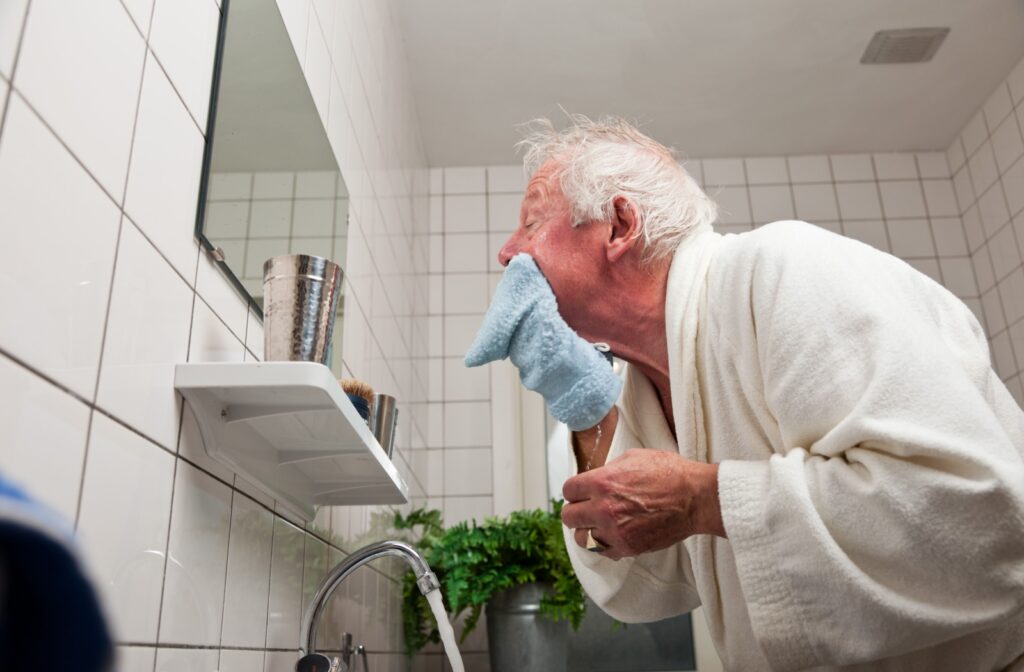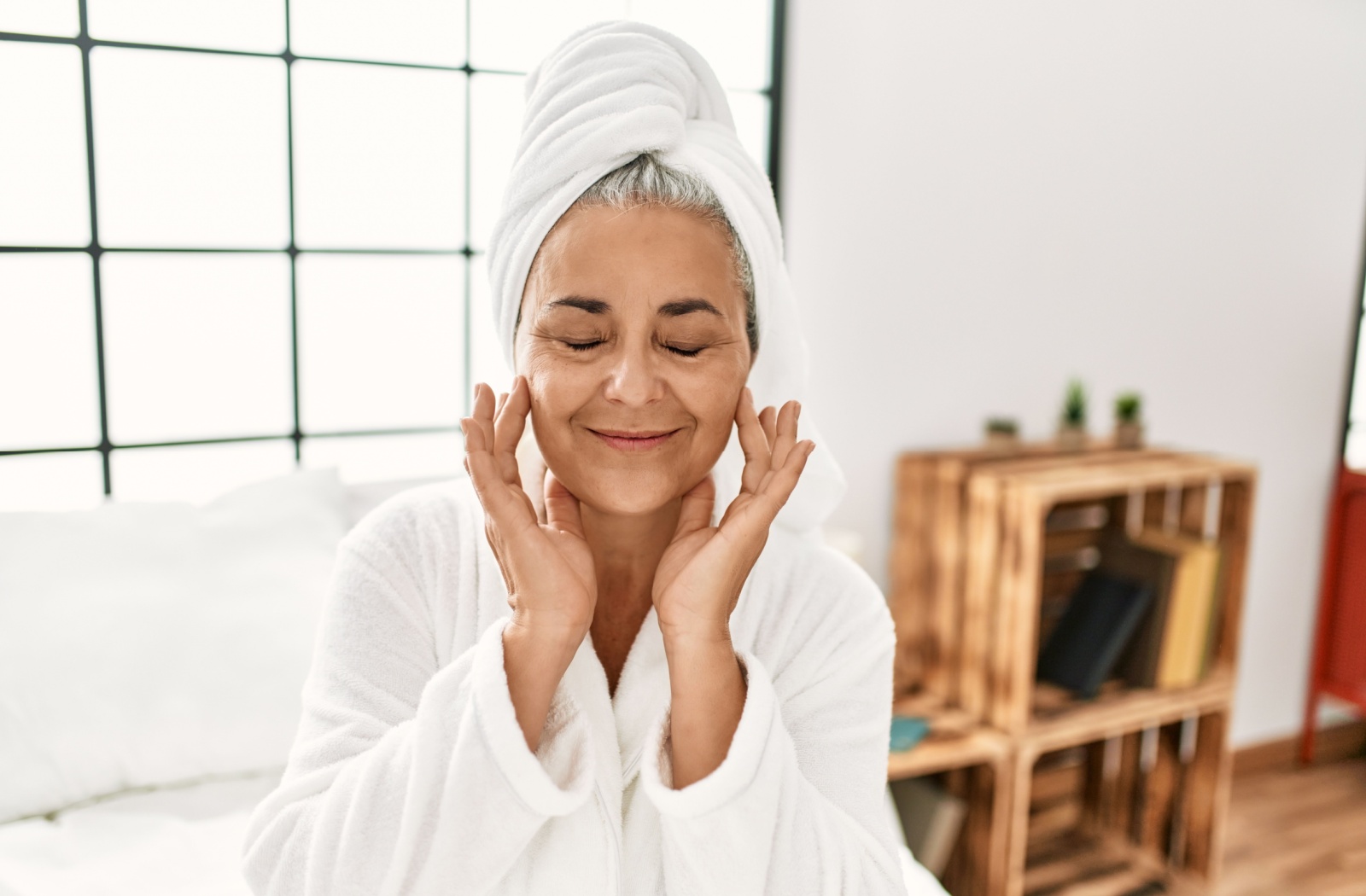Maintaining proper hygiene is crucial for comfort and overall health as we age. One aspect that often raises questions is how often a senior should shower. The truth is, there isn’t a one-size-fits-all-answer for how often seniors should shower because it can vary from person to person.
Age and skin conditions, health conditions and physical abilities, or the climate or season can all affect the recommended shower frequency. Another thing to remember is that a full shower isn’t necessarily always required to maintain good personal hygiene. We’ll review some ideas below that a senior can implement between showers.
The importance of good hygiene—however that looks for each individual—highlights the need for planning our senior living choices. Showering and other daily activities may become difficult for some seniors to do alone. Assisted living or other forms of senior care may be beneficial to consider.
Factors Influencing Ideal Shower Frequency
The answer to how often seniors should shower isn’t one-size-fits-all. It varies based on several factors:
Age & Skin Sensitivity
Our skin becomes thinner and more sensitive as we age. Frequent showering with hot water can strip the skin of its natural oils, leading to dryness and irritation. So, a senior’s age can affect their skin condition and play a significant role in determining the appropriate shower frequency.
Health Conditions & Physical Abilities
Chronic conditions such as arthritis, dementia, or cardiovascular diseases can impact a senior’s ability to shower independently. These health issues may also necessitate adjustments in shower frequency to ensure safety and comfort.
Mobility issues or physical disabilities can also make daily showering challenging. Finding a balance between maintaining hygiene and ensuring safety is essential in such cases. For example, if a senior requires assistance to shower but only has assistance 2 or 3 times per week, that is likely how often they should shower because of the safety risks.
Climate & Season
The local climate and time of year can also affect how often seniors should shower. Seniors living in warmer or more humid climates or seasons may require more frequent showers due to increased sweating. On the other hand, a senior living in a cooler climate may allow for a more relaxed frequency.
Addressing a Common Misconception
There is a common misconception that less frequent showering leads to poor hygiene. But ultimately, the above factors are only guidelines because we all have unique bodies with varying needs. So, the decision on how often to shower is a personal one.
An important thing to remember is that a senior can maintain cleanliness through various other methods, and over-showering can sometimes do more harm than good.

Tips on Maintaining Good Personal Hygiene for Seniors
Maintaining personal hygiene doesn’t always require a full shower. Here are some practical tips to help seniors stay clean and comfortable:
Alternative Cleaning Methods
Many seniors won’t require a full daily shower. But that doesn’t mean they don’t need any cleaning. Consider these alternatives for days when a full shower isn’t necessary or feasible:
- Sponge baths: A quick sponge bath can freshen up essential areas like the face, underarms, and private areas. A basin filled with water and a washcloth is typically all a senior needs for a sponge bath. So, this may be an especially great option for a senior with mobility issues.
- No-rinse cleansers: These products are designed to clean without rinsing and can be very convenient. A senior could even get something like a no-rinse shampoo, allowing them to clean their hair without a full shower.
Create a Comfortable Shower Experience
Making the showering process as pleasant as possible can encourage regular hygiene:
- Warm water: Use lukewarm or warm water to avoid drying out the skin.
- Soft towels: Pat the skin dry gently with soft towels to avoid irritation on sensitive skin
- Moisturizing: Apply a gentle moisturizer after showering to maintain skin hydration and prevent drying and cracking.
Don’t Forget Bathroom Safety
Ensuring the bathroom space is safe and accessible is a crucial part of helping a senior maintain good personal hygiene:
- Install grab bars: These can provide much-needed support and prevent falls.
- Non-slip mats: Place these in the shower to reduce the risk of slipping.
- Shower chairs: These chairs can make showering more comfortable and safer for those with limited mobility.
Consider Future Needs
Finding a shower routine for seniors involves balancing health, safety, and personal preferences. While there is no universal answer, considering individual circumstances and consulting healthcare professionals can help determine the best approach.
How often one should shower isn’t the only question. The question may eventually become, how does one shower safely without help? There are several answers, whether it’s a matter of arranging in-home assistance or transitioning into a senior living community. Call our team at Somerby Sandy Springs today to discuss how our community could benefit you or your loved one. We’re happy to answer all your questions and schedule a community tour.











